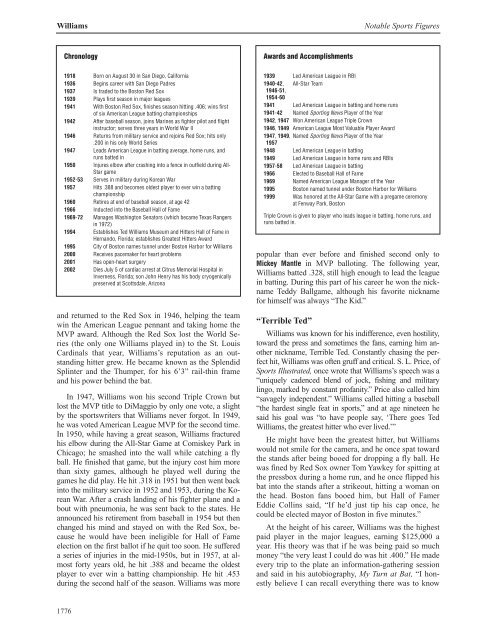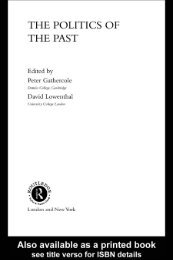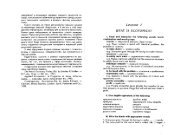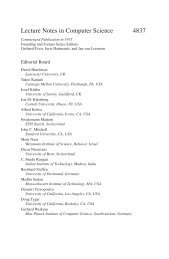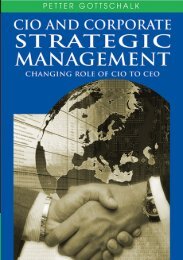Frank Thomas
Frank Thomas
Frank Thomas
Create successful ePaper yourself
Turn your PDF publications into a flip-book with our unique Google optimized e-Paper software.
Williams Notable Sports Figures<br />
Chronology<br />
1918 Born on August 30 in San Diego, California<br />
1936 Begins career with San Diego Padres<br />
1937 Is traded to the Boston Red Sox<br />
1939 Plays first season in major leagues<br />
1941 With Boston Red Sox, finishes season hitting .406; wins first<br />
of six American League batting championships<br />
1942 After baseball season, joins Marines as fighter pilot and flight<br />
instructor; serves three years in World War II<br />
1946 Returns from military service and rejoins Red Sox; hits only<br />
.200 in his only World Series<br />
1947 Leads American League in batting average, home runs, and<br />
runs batted in<br />
1950 Injures elbow after crashing into a fence in outfield during All-<br />
Star game<br />
1952-53 Serves in military during Korean War<br />
1957 Hits .388 and becomes oldest player to ever win a batting<br />
championship<br />
1960 Retires at end of baseball season, at age 42<br />
1966 Inducted into the Baseball Hall of Fame<br />
1969-72 Manages Washington Senators (which became Texas Rangers<br />
in 1972)<br />
1994 Establishes Ted Williams Museum and Hitters Hall of Fame in<br />
Hernando, Florida; establishes Greatest Hitters Award<br />
1995 City of Boston names tunnel under Boston Harbor for Williams<br />
2000 Receives pacemaker for heart problems<br />
2001 Has open-heart surgery<br />
2002 Dies July 5 of cardiac arrest at Citrus Memorial Hospital in<br />
Inverness, Florida; son John Henry has his body cryogenically<br />
preserved at Scottsdale, Arizona<br />
and returned to the Red Sox in 1946, helping the team<br />
win the American League pennant and taking home the<br />
MVP award. Although the Red Sox lost the World Series<br />
(the only one Williams played in) to the St. Louis<br />
Cardinals that year, Williams’s reputation as an outstanding<br />
hitter grew. He became known as the Splendid<br />
Splinter and the Thumper, for his 6’3” rail-thin frame<br />
and his power behind the bat.<br />
In 1947, Williams won his second Triple Crown but<br />
lost the MVP title to DiMaggio by only one vote, a slight<br />
by the sportswriters that Williams never forgot. In 1949,<br />
he was voted American League MVP for the second time.<br />
In 1950, while having a great season, Williams fractured<br />
his elbow during the All-Star Game at Comiskey Park in<br />
Chicago; he smashed into the wall while catching a fly<br />
ball. He finished that game, but the injury cost him more<br />
than sixty games, although he played well during the<br />
games he did play. He hit .318 in 1951 but then went back<br />
into the military service in 1952 and 1953, during the Korean<br />
War. After a crash landing of his fighter plane and a<br />
bout with pneumonia, he was sent back to the states. He<br />
announced his retirement from baseball in 1954 but then<br />
changed his mind and stayed on with the Red Sox, because<br />
he would have been ineligible for Hall of Fame<br />
election on the first ballot if he quit too soon. He suffered<br />
a series of injuries in the mid-1950s, but in 1957, at almost<br />
forty years old, he hit .388 and became the oldest<br />
player to ever win a batting championship. He hit .453<br />
during the second half of the season. Williams was more<br />
1776<br />
Awards and Accomplishments<br />
1939 Led American League in RBI<br />
1940-42, All-Star Team<br />
1946-51,<br />
1954-60<br />
1941 Led American League in batting and home runs<br />
1941-42 Named Sporting News Player of the Year<br />
1942, 1947 Won American League Triple Crown<br />
1946, 1949 American League Most Valuable Player Award<br />
1947, 1949, Named Sporting News Player of the Year<br />
1957<br />
1948 Led American League in batting<br />
1949 Led American League in home runs and RBIs<br />
1957-58 Led American League in batting<br />
1966 Elected to Baseball Hall of Fame<br />
1969 Named American League Manager of the Year<br />
1995 Boston named tunnel under Boston Harbor for Williams<br />
1999 Was honored at the All-Star Game with a pregame ceremony<br />
at Fenway Park, Boston<br />
Triple Crown is given to player who leads league in batting, home runs, and<br />
runs batted in.<br />
popular than ever before and finished second only to<br />
Mickey Mantle in MVP balloting. The following year,<br />
Williams batted .328, still high enough to lead the league<br />
in batting. During this part of his career he won the nickname<br />
Teddy Ballgame, although his favorite nickname<br />
for himself was always “The Kid.”<br />
“Terrible Ted”<br />
Williams was known for his indifference, even hostility,<br />
toward the press and sometimes the fans, earning him another<br />
nickname, Terrible Ted. Constantly chasing the perfect<br />
hit, Williams was often gruff and critical. S. L. Price, of<br />
Sports Illustrated, once wrote that Williams’s speech was a<br />
“uniquely cadenced blend of jock, fishing and military<br />
lingo, marked by constant profanity.” Price also called him<br />
“savagely independent.” Williams called hitting a baseball<br />
“the hardest single feat in sports,” and at age nineteen he<br />
said his goal was “to have people say, ‘There goes Ted<br />
Williams, the greatest hitter who ever lived.’”<br />
He might have been the greatest hitter, but Williams<br />
would not smile for the camera, and he once spat toward<br />
the stands after being booed for dropping a fly ball. He<br />
was fined by Red Sox owner Tom Yawkey for spitting at<br />
the pressbox during a home run, and he once flipped his<br />
bat into the stands after a strikeout, hitting a woman on<br />
the head. Boston fans booed him, but Hall of Famer<br />
Eddie Collins said, “If he’d just tip his cap once, he<br />
could be elected mayor of Boston in five minutes.”<br />
At the height of his career, Williams was the highest<br />
paid player in the major leagues, earning $125,000 a<br />
year. His theory was that if he was being paid so much<br />
money “the very least I could do was hit .400.” He made<br />
every trip to the plate an information-gathering session<br />
and said in his autobiography, My Turn at Bat, “I honestly<br />
believe I can recall everything there was to know


